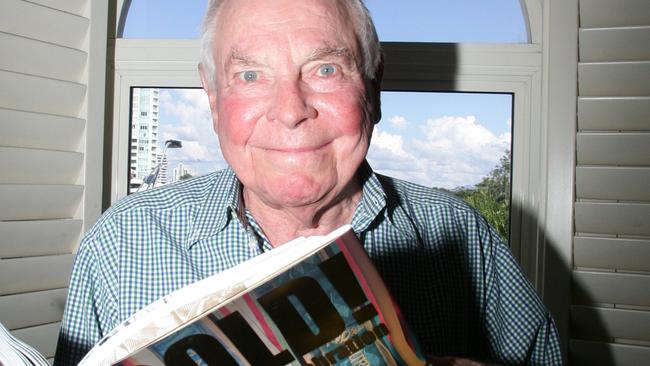Olympic Games spirit inspired Australian journalism legend Harry Gordon
THE late Harry Gordon had a varied career in journalism before turning to writing histories, and a role as official historian to the Australian Olympic Committee.

Today in History
Don't miss out on the headlines from Today in History. Followed categories will be added to My News.
When young journalist Harry Gordon landed the plum job of reporting on the 1952 Helsinki Olympics, his faith in humanity was restored. A correspondent in Korea the year before, he had seen some of the worst people could inflict on each other. By contrast the Olympics showed humanity in its best light, people meeting (mostly) peacefully in the name of sport.
Gordon, who died on Wednesday, was so impressed by the Games spirit he went on to become an Olympic historian. Over the course of his career Gordon covered every Olympics from Helsinki to Sochi and wrote dozens of books sharing his passion for history.
He was born Henry Alfred Gordon on November 9, 1925, the son of Harry and Marjorie Gordon in Melbourne. Harry senior was a painter and docker and sometime professional prizefighter. Harry junior was educated at Melbourne High School but left at the age of 16 , heading to Sydney to kick off his career in newspapers as a copy boy at The Daily Telegraph (then owned by Frank Packer). With many experienced reporters serving in the war Gordon found himself writing mainly sport.
War interrupted that career when he joined the RAAF in 1943, just weeks after turning 18. He attained the rank of Leading Aircraftman but was discharged in 1944 and returned to journalism at The Daily Telegraph. He then moved to the Courier-Mail in Brisbane and the Straits Times in Singapore, for which he reported on the execution of Japanese war criminals in Changi prison.
In 1949, by then a seasoned reporter, he joined the Melbourne Sun. The next year he was reporting from the thick of the Korean War. He would later say he had some “hairy moments with an infantry battalion; I saw a lot of suffering, and a fair amount of death.” One of the journalists he had served with as a copy boy, Derek Pearcy, was killed in Korea in 1951 when his jeep hit a mine.
Gordon’s posting to London in 1951 and then his stint at the Olympics in Helsinki in 1952 was a welcome change of pace. Back home in Melbourne, his Olympic and sports experience was called on to help set up the media centre for the 1956 Olympic Games.
The peace and love of the Games was disrupted for another posting to a war zone, this time reporting on the Algerian struggle for independence against France. But he would always return to the Games, reporting on some of Australia’s greatest moments from the 1950s onward. In 1960 he moved into the production of newspapers, a path that led him to the editor’s office in 1968. As editor of the Sun his crowning achievement was a campaign to cut the road toll with the message “Declare war on 1034”, the number taken from the death toll on Victoria’s roads in 1969. The campaign played a major role in bringing about changes in road safety legislation, including making wearing a seatbelt compulsory.
Through the ’70s and into the ’80s he rose to the level of editor-in-chief at both the Courier-Mail and The Herald and Weekly Times and later director of Queensland Newspapers, meanwhile kicking off his career as an author of history books.
One of his earliest titles, An Eyewitness History Of Australia (1976), won the National Book Council’s First Prize for Australian Literature in 1977. In 1980 he was made a companion of the Order of St Michael and St George (CMG) for his service to journalism in Queensland.
He continued writing, with an emphasis on Australians at war or at sport. He liked to say, “There are two areas where Australians continue to make legends and become heroes, War and sport.’’
In 1992 he became the official historian to the Australian Olympic Committee. It was a fitting appointment, his knowledge of the Olympics was prodigious and would produce books such as From Athens With Pride — The Official History Of The Australian Olympic Movement 1894 To 2014.
In 1993, he was made a Member of the Order of Australia (AM) for service to the community and the promotion of Australian sport. In 2000 he chose street names for the Sydney Olympic village and took part in the torch relay.
Inducted into the Melbourne Press Club’s Hall of Fame in 2013 he said: “Journalism provides a most wonderful life of contrasts. Twice I went from battlefields where people were killing each other, to Olympic Games in Helsinki and Rome, where the mood was peace and good will.’’
Gordon is survived by his wife Joy and children Michael, John and Sally.


